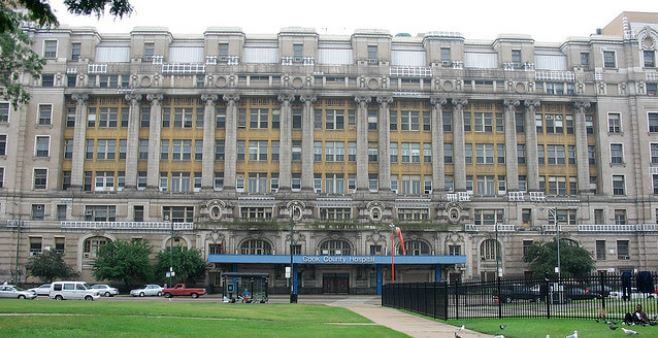Simon Cohen
London

In 1968 I was a senior registrar at a London teaching hospital. My ambition was to become a staff member at a major London institution and at that time one of the requirements was a qualification known as the BTA (Been to America). My chief, probably correctly, recognized that I was not much of a researcher, so I would need a clinical job to get the BTA. He received a request from Cook County Hospital in Chicago to send a suitable person to be an instructor in medicine. Cook County Hospital had a reputation for providing vast clinical experience.
When I arrived in Chicago I was met by some distant relatives who kindly helped me find accommodation—a small apartment in Canterbury Court on State and Division. This had been a very reputable building in the thirties but they did not realise, and I eventually found out, that it functioned partly as a brothel. When I arrived at County Hospital I was warmly greeted by my colleagues and the staff. I was overwhelmed when the head of the department gave me his old car, a Volkswagen.
The hospital itself was something a shock. When I entered I noted a plaque on the wall in memory of an intern who fell in the line of duty, killed by a patient’s angry relative. The hospital serves a poor part of the city and there were many problems related to alcohol. In particular, there were frequent admissions of patients with delirium tremens, a condition when withdrawal from alcohol causes shakes and sweats and the patient suffers frightening visual, often zoological, hallucinations. At that time the treatment for such a condition included chaining the patients to the bed. On one famous occasion a patient was seen running down the corridor with the bed still attached to his back.
The day started in the ward office where the residents gave a morning report on the patients. I found this a little strange, although it is very common practice, because I expected such presentations to take place at the bedside. There were also expressions that I needed to learn such as a patient had “taken the pipe”—that is, he had died overnight.
Some of the consultants had memorable habits. One of the cardiologists would sit the patient down facing the team, place his stethoscope over the patient’s chest from behind, and announce the diagnosis was alcoholic cardiomyopathy. Although he could not know this simply from listening to the heart, he was still probably right as alcohol was such a common problem in the County population at that time.
As I was on the renal service, looking at renal biopsy specimens was a regular event. The chief of pathology kept his specimens under lock and key. I am still not sure why.
1968, of course, was the year of the Democratic Party Convention that sparked riots in Chicago. I did not actually attend but I saw things from a distance. I managed to acquire a straw boater hat, now very battered, supporting the Democratic candidate. At that time there was a strong connection between Cook County Hospital and the Democratic Party machine. All the ancillary staff were members of the Democratic Party and on Election Day they would all be absent.
The intensive care unit of County Hospital was outstanding. Professor Schumaker, one of the pioneers in the field, was associated with it. Unfortunately there was a great deal of trauma and therefore a lot of experience in that unit.
I enjoyed my time at Cook County Hospital, possibly because I was attracted to the bizarre, but also because I suddenly found myself being regarded as an attractive marital prospect. Junior doctors in the National Health Service in England at that time were not viewed as offering a great future; however this was different in the US and I found myself being presented with possible soul mates. On one occasion I was introduced to a young lady who was said to be worth twelve million dollars. She had a maid in her apartment! I did not take the bait.
I had some reservations about Cook County because one of my aims in going to the States was to get experience in hemodialysis, which I did not have in my hospital in London. At that time the dialysis unit at Cook County Hospital, actually in the associated Mount Sinai Hospital, was embryonic. I received an invitation, again from distant relatives, to go for Thanksgiving in Minneapolis. Whilst I was there I visited Hennepin County Hospital and met the director of the dialysis unit, who immediately offered me a job. The dialysis unit seemed much bigger and better organized than the one in Chicago at that time, so I accepted the position and moved to Minneapolis. I made some very good friends in Chicago and still have fond memories of the city and Cook County Hospital.
SIMON COHEN, MBBS, FRCP, is an accredited specialist in internal medicine and nephrology. He was consultant physician and nephrologist, physician to intensive care, and lecturer in medicine at the University College London Medical School and Hospital, and since 2005 has been honorary consultant physician at the UCL intensive care unit. He was instructor in medicine at Cook County Hospital and the Chicago Medical School (1985), instructor and associate in medicine at the University of Minnesota Medical School (1969–1970), and physician to the renal transplant unit, Beilinson Hospital, Israel.

Leave a Reply